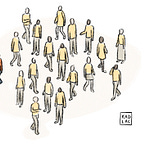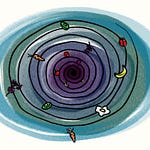👋 Hello! I'm Nate Kadlac, and this is Plan Your Next. It’s a newsletter that connects design, creativity, and how you prepare for your next thing.
Every Sunday, I aim to make this newsletter as timeless as my busted Apple Watch. If you’re new here, join us!
What’s new this week?
🎤 The talented Paul Lecrone posted our full conversation from his podcast on YouTube. We both dissect art, life, and everything in between.
📷 It took long enough, but I created an Unsplash account and uploaded a few photos from past trips. Feel free to use them on any projects!
✏️ I’m building something for writers. Have you ever needed quick feedback or editing for your writing, but don’t know who to ask? Book a time on my calendar. I’d love to chat.
Good morning from Los Angeles!
All week, we’ve been interviewing candidates for a new position in our company. This is not an easy job, and the role requires the ability to speak multiple languages. Not in the literal sense, but to work closely between engineers, designers, support, customers, and stakeholders.
This person needs the ability to determine what to work on; when to work on it, and to run at it with the same consistency as Forrest Gump had running across the country.
This person needs to be able to think for themselves.
Innovation rarely happens when you surround yourself with people with similar ideas and conventions. Having your own thoughts and ideas about your vision is necessary to escape the black hole which contains all existing strategies.
Kevin Lee points this out after a conversation with two marketers at separate Consumer Packaged Goods (CPG) companies:
It's a constant reminder that we can't rely on any playbooks or silver bullets. We can learn and absorb from the best in the industry, but at the end of the day, we have to pioneer our own strategies if we want to see outsized outcomes.
Paul Graham mentions this common trait with successful startups: founders and early-stage employees almost are almost always independent-minded; because otherwise, conventional thinking would get you nowhere.
As a company grows, independent-minded thinkers get overrun with conventional-minded thinkers, and so the original spirit inevitably gets diluted.
This same problem surfaces not only at successful startups, but in our own lives. Surrounding yourself with too many conventional-minded thinkers will dilute your own thinking.
How to think for yourself
In his essay, Paul Graham breaks it down into three parts:
Fastidiousness about truth
Resistance to being told what to think
Be curious
Fastidiousness about truth means being careful about your degree of belief. Be speculative about extreme cases. Annie Duke—author of Thinking in Bets—likes to make decisions based on probabilities. Outcomes are never guaranteed, and we should think carefully about not putting all of our thought eggs into one basket. Without this nuance, you won’t allow yourself to be truly independent.
Resistance to being told what to think is the most difficult because it’s the most visible. To approach life counterintuitively can get you laughed out of a room. If you can’t get rid of this mindset, the next best thing is to surround yourself with independent thinkers.
When I left the design agency world, I was fed up with the desire to please. The fear of losing accounts was the biggest risk to mitigate in that world. So I left. I started to build my own products and surround myself with those who also didn’t know any better.
Be curious. As children, everything is new and surrounded by play. Most of us lose this mindset as we become adults. You can’t be an independent thinker if you’re not curious about the strange and weird things around you.
The comedian Whitney Cummings once said you can cultivate being funny by stopping to look at the funny shit that happens every day. You can choose to ignore it, but it’s there, waiting to be made fun of. And who is more independent-minded than the best comedians?
Like cultivating humor, you can also cultivate taste by looking closely at the objects around you. And to become an independent-thinker, curiosity is the Willy Wonka golden ticket.
Earlier this year, I challenged myself to write consistently so I could research and clarify my own thinking. I find it too easy to just consume the things that you read, taking them as fact.
It seems simple, but to become a more independent-minded thinker, write consistently, and surround yourself with curious people.
As always, my calendar is always open to chat about your crazy ideas. I’d love to hear what you’re thinking about.
⚡️ Inspiration for next week
Muir Way Vintage Relief Prints
These vintage relief maps are incredibly beautiful. They use digital elevation data to give it a 3D effect.
An online directory of interesting people and their content. You can find an individual’s tweets, articles, videos, and podcasts all in one place.
Sari Azout on thinking for yourself
Love this tweet about Sari Azout, who is my straight-up design/entrepreneur crush at the moment. “If you want to find good ideas, you have to dedicate time to think.” Writing is one of the best ways to do this.
Synthesis started from a question by Elon Musk. What might a school look like if it were built on first-principles thinking? It’s aimed at kids aged 8-14 years old, and not based on separation by grade levels. It focuses on problem-solving. Here’s the story.
👋 See you next Sunday
As always, my calendar is always open to chat about your crazy ideas.
Have a great week,
Nate
Twitter: @kadlac
Web: kadlac.com


















